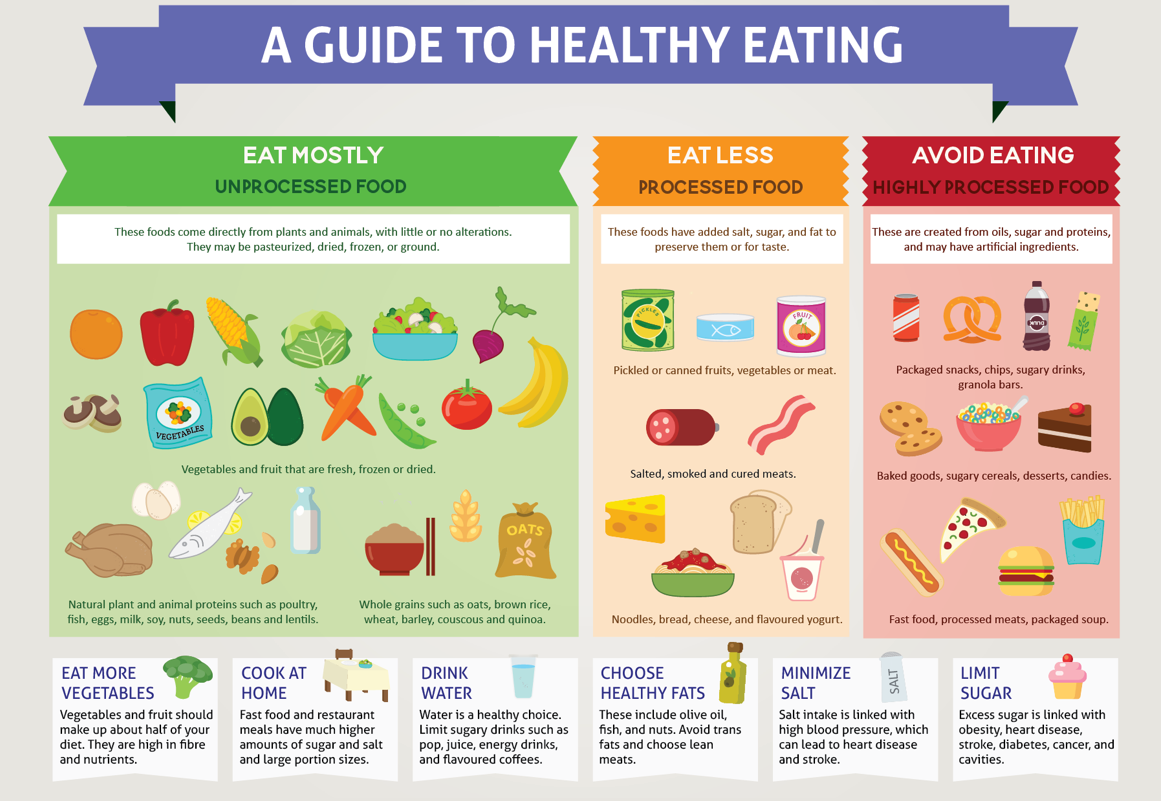
Recent research on the health impact of highly processed foods and drinks and the risk of obesity and diabetes

There are benefits to considering a change to a healthier and balanced diet – particularly when overweight. Recent research has suggested that there may be health advantages to eating less processed food. But what is processed food, and why is there concern over this type of food? All foods can be classified according to their degree of processing. Unprocessed or minimally processed foods receive either no treatment or are treated by, for example, boiling, drying, roasting, or fermenting to either make them safe to consume, palatable or for longer-term storage.
Another category is processed culinary ingredients based on natural or minimally processed foods. When these ingredients, such as oils, fats, salt and sugar, are used in moderation, they contribute to a diverse and balanced diet. Processed foods are treated in a manner that alters their natural state. This is often done by adding processed culinary ingredients to natural products - such as those found in canned foods, packaged convenience foods, and other foods with additives to enhance flavour, sweetness and palatability. Examples of traditional Qatari unprocessed/minimally processed food and drink are dates and laban, and an example of highly processed food would be multipack, chocolate biscuits and sweetened cola. A common characteristic of these foods is the relatively high sugar and fat content that makes them very rich in calories, leading to weight gain. For example, a chocolate biscuit typically contains 5g of sugar, of which 4 g (80%) is added during processing.

Recent research has indicated a link between consuming highly processed foods and drinks and the risk of becoming overweight. In a study of over 100,000 people in France for 6 years, a high proportion of highly processed food in the diet was associated with a higher risk of developing type 2 diabetes – the most common form of diabetes [1]. A clinical trial conducted at the National Institutes of Health Clinical Center, Bethesda, USA, showed that when people ate highly processed foods for 2 weeks, they consumed 20% more calories per day and gained about 1 kilogram in weight [2]. Further investigation is required to confirm this effect.
Still, researchers have attributed the observation to the ingredients used in producing these foods and drinks - such as added sugar, fat, salt, other additives and sweeteners. Highly processed foods with high-calorie content, often with a highly appealing taste and texture (for example, soft and easily chewable), have been associated with the risk of overeating. They also often have low fiber and protein content linked to low satiation feeling and the urge to eat more. Frequent consumption of sugars – particularly simple sugars, such as table sugar (sucrose), glucose and fructose may cause blood glucose to increase rapidly. Over time, this alters the body’s normal response to glucose, such as insulin secretion from the pancreas to regulate blood sugar levels. There is also decreased uptake of glucose by muscle and fat tissue and cessation of glucose production by the liver in response to insulin – a condition called insulin resistance. Progressively, the impaired response to high blood glucose and tissue response to insulin stresses the insulin-producing cells of the pancreas and can lead to insufficient insulin secretion and the development of diabetes.
So, how can we maintain a healthy diet? Natural or minimally processed foods, mainly of plant origin, are recommended to account for a major proportion of the diet. We can consider moderating our consumption of oils, fats, salt, and sugars – being mindful that highly processed foods may be rich in these ingredients. The USA Centre for Disease Control and Prevention (CDC) describes the benefits of healthy balanced diets to “live longer, support muscles, boost immunity, strengthen bones, lower risk of heart disease, type 2 diabetes, and some cancers.” Many governments are now considering the health concerns and economic burden of obesity and diabetes linked to the excessive consumption of highly processed foods [3]. The good news is that some foods in the traditional Qatari diet – are minimally processed and, when consumed in moderate amounts, contribute to a healthy, balanced diet. Indeed, we are reminded in the video interview, shown in Qatar National Museum, of the era of pearl fishermen in Qatar highlights a traditional breakfast of that time was often “One large date” before setting off to dive.
Section Contributors
Contributed by: Dr. Patrick Wijten (Postdoctoral Researcher, QBRI), Dr. Racha Chouaib (Postdoctoral Researcher, QBRI), Ms. Israa Elbashir Elnour Elbashir (Research Assistant, QBRI)
Arabic text validation: Rowaida Ziad Taha (Associate Researcher, QBRI)
Editors: Dr. Adviti Naik (Postdoctoral Researcher, QBRI), Dr. Prasanna Kolatkar (Senior Scientist, QBRI)
For references, please click here.
Related News

HBKU’s Qatar Biomedical Research Institute and Qatar Computing Research Institute Jointly Publish Risk Tool to Fight Diabetes

HBKU’s Qatar Biomedical Research Institute Participates in Virtual Diabetes Symposium

Qatar Biomedical Research Institute to Cooperate with Sultan Qaboos University on Autism Research

HBKU’s Qatar Biomedical Research Institute Releases Findings of Pioneering Autism Study

HBKU’s Qatar Biomedical Research Institute and Qatar Computing Research Institute Jointly Publish Risk Tool to Fight Diabetes

HBKU’s Qatar Biomedical Research Institute Participates in Virtual Diabetes Symposium

Qatar Biomedical Research Institute to Cooperate with Sultan Qaboos University on Autism Research

HBKU’s Qatar Biomedical Research Institute Releases Findings of Pioneering Autism Study

HBKU’s Qatar Biomedical Research Institute and Qatar Computing Research Institute Jointly Publish Risk Tool to Fight Diabetes

HBKU’s Qatar Biomedical Research Institute Participates in Virtual Diabetes Symposium

Qatar Biomedical Research Institute to Cooperate with Sultan Qaboos University on Autism Research

HBKU’s Qatar Biomedical Research Institute Releases Findings of Pioneering Autism Study

HBKU’s Qatar Biomedical Research Institute and Qatar Computing Research Institute Jointly Publish Risk Tool to Fight Diabetes

HBKU’s Qatar Biomedical Research Institute Participates in Virtual Diabetes Symposium

Qatar Biomedical Research Institute to Cooperate with Sultan Qaboos University on Autism Research

HBKU’s Qatar Biomedical Research Institute Releases Findings of Pioneering Autism Study

HBKU’s Qatar Biomedical Research Institute and Qatar Computing Research Institute Jointly Publish Risk Tool to Fight Diabetes

HBKU’s Qatar Biomedical Research Institute Participates in Virtual Diabetes Symposium

Qatar Biomedical Research Institute to Cooperate with Sultan Qaboos University on Autism Research

HBKU’s Qatar Biomedical Research Institute Releases Findings of Pioneering Autism Study

HBKU’s Qatar Biomedical Research Institute and Qatar Computing Research Institute Jointly Publish Risk Tool to Fight Diabetes

HBKU’s Qatar Biomedical Research Institute Participates in Virtual Diabetes Symposium

Qatar Biomedical Research Institute to Cooperate with Sultan Qaboos University on Autism Research

HBKU’s Qatar Biomedical Research Institute Releases Findings of Pioneering Autism Study

HBKU’s Qatar Biomedical Research Institute and Qatar Computing Research Institute Jointly Publish Risk Tool to Fight Diabetes

HBKU’s Qatar Biomedical Research Institute Participates in Virtual Diabetes Symposium

Qatar Biomedical Research Institute to Cooperate with Sultan Qaboos University on Autism Research

HBKU’s Qatar Biomedical Research Institute Releases Findings of Pioneering Autism Study

HBKU’s Qatar Biomedical Research Institute and Qatar Computing Research Institute Jointly Publish Risk Tool to Fight Diabetes

HBKU’s Qatar Biomedical Research Institute Participates in Virtual Diabetes Symposium

Qatar Biomedical Research Institute to Cooperate with Sultan Qaboos University on Autism Research

HBKU’s Qatar Biomedical Research Institute Releases Findings of Pioneering Autism Study

HBKU’s Qatar Biomedical Research Institute and Qatar Computing Research Institute Jointly Publish Risk Tool to Fight Diabetes

HBKU’s Qatar Biomedical Research Institute Participates in Virtual Diabetes Symposium

Qatar Biomedical Research Institute to Cooperate with Sultan Qaboos University on Autism Research

HBKU’s Qatar Biomedical Research Institute Releases Findings of Pioneering Autism Study

HBKU’s Qatar Biomedical Research Institute and Qatar Computing Research Institute Jointly Publish Risk Tool to Fight Diabetes

HBKU’s Qatar Biomedical Research Institute Participates in Virtual Diabetes Symposium

Qatar Biomedical Research Institute to Cooperate with Sultan Qaboos University on Autism Research

HBKU’s Qatar Biomedical Research Institute Releases Findings of Pioneering Autism Study

HBKU’s Qatar Biomedical Research Institute and Qatar Computing Research Institute Jointly Publish Risk Tool to Fight Diabetes

HBKU’s Qatar Biomedical Research Institute Participates in Virtual Diabetes Symposium

Qatar Biomedical Research Institute to Cooperate with Sultan Qaboos University on Autism Research

HBKU’s Qatar Biomedical Research Institute Releases Findings of Pioneering Autism Study

HBKU’s Qatar Biomedical Research Institute and Qatar Computing Research Institute Jointly Publish Risk Tool to Fight Diabetes

HBKU’s Qatar Biomedical Research Institute Participates in Virtual Diabetes Symposium

Qatar Biomedical Research Institute to Cooperate with Sultan Qaboos University on Autism Research

HBKU’s Qatar Biomedical Research Institute Releases Findings of Pioneering Autism Study

HBKU’s Qatar Biomedical Research Institute and Qatar Computing Research Institute Jointly Publish Risk Tool to Fight Diabetes

HBKU’s Qatar Biomedical Research Institute Participates in Virtual Diabetes Symposium

Qatar Biomedical Research Institute to Cooperate with Sultan Qaboos University on Autism Research

HBKU’s Qatar Biomedical Research Institute Releases Findings of Pioneering Autism Study

HBKU’s Qatar Biomedical Research Institute and Qatar Computing Research Institute Jointly Publish Risk Tool to Fight Diabetes

HBKU’s Qatar Biomedical Research Institute Participates in Virtual Diabetes Symposium

Qatar Biomedical Research Institute to Cooperate with Sultan Qaboos University on Autism Research

HBKU’s Qatar Biomedical Research Institute Releases Findings of Pioneering Autism Study

HBKU’s Qatar Biomedical Research Institute and Qatar Computing Research Institute Jointly Publish Risk Tool to Fight Diabetes

HBKU’s Qatar Biomedical Research Institute Participates in Virtual Diabetes Symposium

Qatar Biomedical Research Institute to Cooperate with Sultan Qaboos University on Autism Research

HBKU’s Qatar Biomedical Research Institute Releases Findings of Pioneering Autism Study

HBKU’s Qatar Biomedical Research Institute and Qatar Computing Research Institute Jointly Publish Risk Tool to Fight Diabetes

HBKU’s Qatar Biomedical Research Institute Participates in Virtual Diabetes Symposium

Qatar Biomedical Research Institute to Cooperate with Sultan Qaboos University on Autism Research

HBKU’s Qatar Biomedical Research Institute Releases Findings of Pioneering Autism Study

HBKU’s Qatar Biomedical Research Institute and Qatar Computing Research Institute Jointly Publish Risk Tool to Fight Diabetes

HBKU’s Qatar Biomedical Research Institute Participates in Virtual Diabetes Symposium

Qatar Biomedical Research Institute to Cooperate with Sultan Qaboos University on Autism Research

HBKU’s Qatar Biomedical Research Institute Releases Findings of Pioneering Autism Study

HBKU’s Qatar Biomedical Research Institute and Qatar Computing Research Institute Jointly Publish Risk Tool to Fight Diabetes

HBKU’s Qatar Biomedical Research Institute Participates in Virtual Diabetes Symposium

Qatar Biomedical Research Institute to Cooperate with Sultan Qaboos University on Autism Research

HBKU’s Qatar Biomedical Research Institute Releases Findings of Pioneering Autism Study

HBKU’s Qatar Biomedical Research Institute and Qatar Computing Research Institute Jointly Publish Risk Tool to Fight Diabetes

HBKU’s Qatar Biomedical Research Institute Participates in Virtual Diabetes Symposium

Qatar Biomedical Research Institute to Cooperate with Sultan Qaboos University on Autism Research

HBKU’s Qatar Biomedical Research Institute Releases Findings of Pioneering Autism Study

HBKU’s Qatar Biomedical Research Institute and Qatar Computing Research Institute Jointly Publish Risk Tool to Fight Diabetes

HBKU’s Qatar Biomedical Research Institute Participates in Virtual Diabetes Symposium

Qatar Biomedical Research Institute to Cooperate with Sultan Qaboos University on Autism Research

HBKU’s Qatar Biomedical Research Institute Releases Findings of Pioneering Autism Study

HBKU’s Qatar Biomedical Research Institute and Qatar Computing Research Institute Jointly Publish Risk Tool to Fight Diabetes

HBKU’s Qatar Biomedical Research Institute Participates in Virtual Diabetes Symposium

Qatar Biomedical Research Institute to Cooperate with Sultan Qaboos University on Autism Research

HBKU’s Qatar Biomedical Research Institute Releases Findings of Pioneering Autism Study

HBKU’s Qatar Biomedical Research Institute and Qatar Computing Research Institute Jointly Publish Risk Tool to Fight Diabetes

HBKU’s Qatar Biomedical Research Institute Participates in Virtual Diabetes Symposium

Qatar Biomedical Research Institute to Cooperate with Sultan Qaboos University on Autism Research

HBKU’s Qatar Biomedical Research Institute Releases Findings of Pioneering Autism Study

HBKU’s Qatar Biomedical Research Institute and Qatar Computing Research Institute Jointly Publish Risk Tool to Fight Diabetes

HBKU’s Qatar Biomedical Research Institute Participates in Virtual Diabetes Symposium

Qatar Biomedical Research Institute to Cooperate with Sultan Qaboos University on Autism Research

HBKU’s Qatar Biomedical Research Institute Releases Findings of Pioneering Autism Study

HBKU’s Qatar Biomedical Research Institute and Qatar Computing Research Institute Jointly Publish Risk Tool to Fight Diabetes

HBKU’s Qatar Biomedical Research Institute Participates in Virtual Diabetes Symposium

Qatar Biomedical Research Institute to Cooperate with Sultan Qaboos University on Autism Research

HBKU’s Qatar Biomedical Research Institute Releases Findings of Pioneering Autism Study

HBKU’s Qatar Biomedical Research Institute and Qatar Computing Research Institute Jointly Publish Risk Tool to Fight Diabetes

HBKU’s Qatar Biomedical Research Institute Participates in Virtual Diabetes Symposium

Qatar Biomedical Research Institute to Cooperate with Sultan Qaboos University on Autism Research

HBKU’s Qatar Biomedical Research Institute Releases Findings of Pioneering Autism Study

HBKU’s Qatar Biomedical Research Institute and Qatar Computing Research Institute Jointly Publish Risk Tool to Fight Diabetes

HBKU’s Qatar Biomedical Research Institute Participates in Virtual Diabetes Symposium

Qatar Biomedical Research Institute to Cooperate with Sultan Qaboos University on Autism Research

HBKU’s Qatar Biomedical Research Institute Releases Findings of Pioneering Autism Study

HBKU’s Qatar Biomedical Research Institute and Qatar Computing Research Institute Jointly Publish Risk Tool to Fight Diabetes

HBKU’s Qatar Biomedical Research Institute Participates in Virtual Diabetes Symposium

Qatar Biomedical Research Institute to Cooperate with Sultan Qaboos University on Autism Research

HBKU’s Qatar Biomedical Research Institute Releases Findings of Pioneering Autism Study

HBKU’s Qatar Biomedical Research Institute and Qatar Computing Research Institute Jointly Publish Risk Tool to Fight Diabetes

HBKU’s Qatar Biomedical Research Institute Participates in Virtual Diabetes Symposium

Qatar Biomedical Research Institute to Cooperate with Sultan Qaboos University on Autism Research















